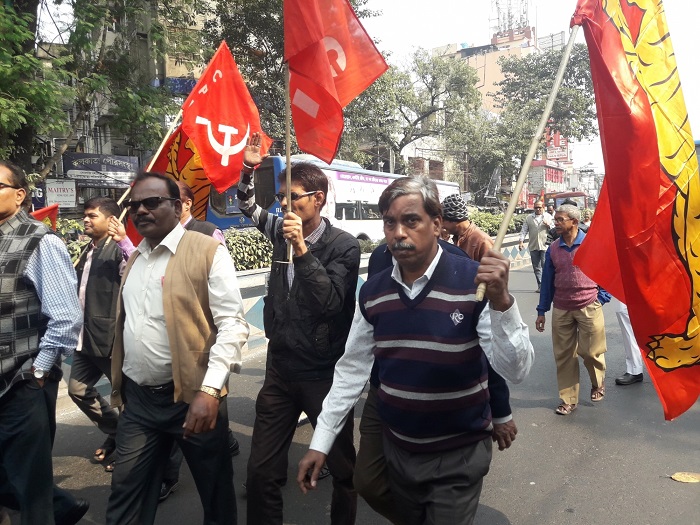
New Delhi, The two-day nationwide strike called by central trade unions in protest against what they describe as the anti-worker policies and unilateral labour reforms evoked a mixed response on its second day on Wednesday, as witnessed on the previous day.
Public transport and banking services continued to remain disrupted on the second day of the strke in some states.
“Bank and insurance sector employees participated in the countrywide strike today (Wednesday) called by the central trade unions,” All India Bank Employees Association (AIBEA) General Secretary C.H. Venkatachalam told IANS.
The 10 unions which have given the strike call include the Indian National Trade Union Congress (INTUC), All India Trade Union Congress (AITUC), Centre of Indian Trade Unions (CITU) Hind Mazdoor Sabha, All India United Trade Union Centre- AIUTUC) Trade Union Coordination Centre (TUCC) and Self Employed Women’s Association (SEWA).
The BJP-backed Bharatiya Mazdoor Sangh (BMS) did not take part in the strike.
Normal life across Kerala was badly hit on Wednesday but by evening more and more shops and establishments opened.
State-owned private buses and contract vehicles remained off the roads but pilgrims to the Sabarimala shrine were allowed to proceed from all places on a limited scale.
While banks were shut, attendances in state and central government offices marginally improved since Tuesday.
While attendance at the State Secretariat, was below 10 per cent, like on Tuesday, Chief Minister Pinarayi Vijayan and his cabinet colleagues did not turn up at their offices.
All university examinations slated for Wednesday have been postponed and educational institutions were closed.
Instead, the strike remained largely ineffective across West Bengal on its second day barring a few sporadic incidents of vandalism.
Train services were briefly affected on the Sealdah-Lakshmikantapur Namkhana and Diamond Harbour sections of Eastern Railway as strike supporters threw banana leaves on overhead wires.
A few trains, including the Howrah-Puri Satabdi Express, however, had to be cancelled, an official said.
There was also no impact of the shutdown on the second day in Karnataka, with government offices and bus services functioning normally across the state.
Government offices, hospitals, commercial establishments, bus and metro services in the state, however, remained largely unaffected .
State-run Karnataka State Road Transport Corp operated about 3,600 of its scheduled 4,100 bus services across the state. Bus services in Bengaluru, however, were fewer, with only 428 bus services plying across the city against the 4,100 scheduled, leading to a high demand for autos and ride-hailing services like Ola and Uber.
Most of the schools in the state that had declared a two-day holiday ahead of the strike remained closed, while few opened on Wednesday.
The strike disrupted normal life across Odisha on Wednesday. It mostly affected vehicular movement at several places as the agitators resorted to road and rail blockades.They obstructed train services in Bhubaneswar, Balasore, Berhampur, Cuttack and many other places in the state.
Schools, colleges and universities in several districts remained closed in view of the strike.
“Our strike has been successful on its second day. We are protesting the anti-labour policies of Narendra Modi government and the people are supporting our cause,” said Sauribandhu Kar, state General Secretary of AITUC.
The trade unions are protesting for the fulfilment of a 12-point charter of demands including inflation control, minimum wages, social security schemes, stalling privatisation of government enterprises, discontinuation of foreign investments in railways, banks and insurance sectors and jobs for unemployed youths among others.









